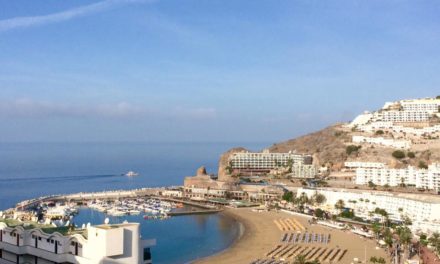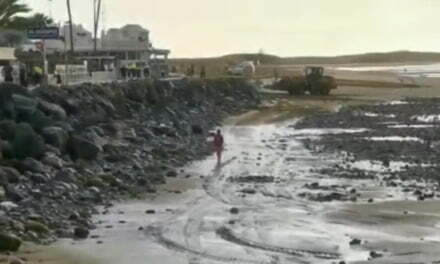Recent shark sightings near the beaches of Melenara and (possibly) San Agustín, from the coasts of Gran Canaria, have reportedly caused some concern among tourists and locals. Or “Panic” if any of the international press are to be believed.
The swift response by authorities to close the beaches and conduct searches for the animal has highlighted the focus on safety, but also raises questions about how we report and react to the relative infrequency and very low risk posed by sharks in these waters.
On June 15th, 2024, beachgoers at Melenara (Telde) spotted a shark near the shore, prompting the immediate closure of the beach. The authorities, prioritising public safety, launched an aerial search to locate the animal. While the search proved unsuccessful, Melenara Beach remained closed for a day. On June 16th, a police drone detected movement in the water, possibly indicating the shark’s presence. This led to the reclosure of Melenara Beach and the additional precautionary closure of the nearby Salinetas Beach, and San Agustín, in the heart of the touristed south. As of June 17, 2024, all beaches have been reopened, having demonstrated a proactive approach to beach safety. There is no history of sharks being problematic on these islands.
Sharing the Ocean
Shark sightings on Gran Canaria are considered relatively uncommon. These magnificent creatures are part of the rich marine life in the Canary Islands, but encounters with humans are infrequent. Experts suggest that sharks typically play a crucial role in maintaining healthy ocean ecosystems. Their presence indicates a balanced marine environment with a healthy food chain. However, the recent sightings, while not necessarily cause for alarm, underscore the importance of understanding these wild animals and any potential for interaction with people.
Species
The specific type of shark involved is unclear, but likely a blue shark, the most commonly encountered shark species in the Canary Islands. These pelagic sharks, meaning they inhabit open waters, often approach the coast in search of food sources like fish and squid. Blue sharks, though large, are not generally considered aggressive towards humans. The last recorded shark to injure a human in the Canary Islands dates back to 2015, and it was a non-fatal incident involving a silky shark, a different species. More recently we have had sightings of Hammerheads, which are again deemed as pretty harmless, and when left alone instinctively avoid people.
Avistamiento de escualo.
La unidad de drones vigila el litoral. pic.twitter.com/O9RIP5hF0V— Policía Local Telde (@PoliciaTelde) June 16, 2024
Risk and Coexistence
Marine biologists and shark experts emphasise the importance of coexistence with sharks. While they acknowledge the potential dangers, they highlight the rarity of attacks. Educational initiatives and responsible behavior by beachgoers can further minimize the risk. Here are some key points to think about:
- Stay informed: Beachgoers are advised to stay updated on local advisories regarding any potential shark activity.
- Swimming with a buddy: This simple rule provides an extra layer of safety, especially in deeper waters.
- Avoiding certain areas: Murky or deep waters are more likely to attract sharks, so it’s best to stick to clear, shallow areas.
- Responsible behavior in the water: Avoid excessive splashing or disposing of food scraps, as this can attract sharks.
By following these guidelines and fostering a culture of respect for the marine environment, people and sharks can coexist safely.
The Importance of Responsible Tourism
Tourism is a vital part of Gran Canaria’s economy, but it’s crucial to maintain a balance between economic benefits and environmental responsibility. Responsible tourism practices encompass respecting the local ecosystem and wildlife.
Tourists can contribute by:
- Choosing operators who promote sustainable practices, such as eco-friendly boat tours.
- Adhering to beach safety guidelines and respecting beach closures implemented for public safety reasons.
- Learning about the local marine life and its importance in the ecosystem.
Moving Forward
Education and awareness campaigns about responsible behaviour in the ocean and the very real, every-day role of sharks in the marine ecosystem. By understanding the rarity of attacks and adopting responsible practices, tourists and locals can, of course, continue to enjoy the beautiful beaches of Gran Canaria while respecting the natural world.
Gran Canaria’s shorelines have always been home to a huge diversity of ocean species, and really if ever has that wild treasure threatened human activity here on the islands. Continued research on shark populations and behaviour, coupled with public education campaigns, can foster a greater understanding of these magnificent creatures.
Here are some additional steps towards sustainable coexistence with marine life:
- Supporting conservation organizations: Organizations dedicated to protecting sharks and their habitats play a crucial role in maintaining healthy marine ecosystems.
- Considering the impact of climate change: Climate change can affect shark populations and behavior. Tourists can support sustainable practices that mitigate climate change’s impact on the environment.
- Responsible fishing practices: Maintaining healthy fish populations













